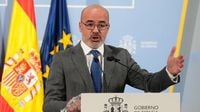The Prosecutor's Office has filed an appeal to the Provincial Court of Madrid against the decision made by Judge Juan Carlos Peinado in the ongoing Begoña Gómez case, which involves allegations of embezzlement of public funds against Francisco Martín Aguirre, the Government Delegate in Madrid. This case has gained significant attention due to its implications regarding the hiring practices within the Spanish government.
At the heart of the controversy is the hiring of Cristina Álvarez, an advisor to La Moncloa, who is alleged to have engaged in "private functions" for Begoña Gómez, the wife of Prime Minister Pedro Sánchez. The Prosecutor's Office is contesting Judge Peinado's decision to investigate Martín Aguirre based on a complaint filed by the political party Vox, which claims that he participated in the hiring process.
In a written appeal, the Public Ministry criticized the judge's ruling, stating that the basis for Martín Aguirre's indictment stems from his position as the general secretary of the Presidency in July 2021, when the hiring of Álvarez took place. However, the Prosecutor's Office highlights that Álvarez was appointed in July 2018, three years before Martín Aguirre assumed his role, making the connection between the two actions illogical.
According to the appeal, the Prosecutor's Office argues that the complaint from Vox lacks substance. They contend that the allegations against Martín Aguirre rely on a "quasi-automatic" assumption of guilt due to his hierarchical position, rather than any actual evidence of wrongdoing. The appeal states, "It seems to be an automatic or objective indictment due to the position held," emphasizing that such a claim is not sufficient to warrant criminal charges.
Furthermore, the Prosecutor's Office asserts that the hiring of Álvarez was not only legal but also customary for positions of trust within the government. They argue that the functions she performed were primarily related to coordinating schedules and security for Gómez and were not indicative of malfeasance. The document states, "The assistance in activities related to the chair, master's program, or the Complutense University is mostly anecdotal or secondary, and does not detract from the public funds or the primary functions that motivated her appointment."
The implications of this case extend beyond the individuals involved. With the indictment of Martín Aguirre, the number of people being investigated has risen to six, including Begoña Gómez, Cristina Álvarez, Joaquín Goyache (rector of the Complutense University of Madrid), Juan José Güemes (director of the IE Business School), and businessman Juan Carlos Barrabés. This expansion of the investigation highlights the potential for broader ramifications within the Spanish political landscape.
Judge Peinado's decision to admit the complaint from Vox has been met with criticism from the Prosecutor's Office, which argues that the judge's reasoning is insufficient. They contend that the court's decision lacks a solid foundation and fails to adequately address the timeline of events, particularly the fact that Álvarez's appointment predates Martín Aguirre's tenure.
In response to the judge's actions, the Prosecutor's Office has expressed its discontent, stating that the judge's insistence on pursuing the case against Martín Aguirre is unwarranted. They argue that the allegations lack clear evidence and that the investigation should adhere to principles of legality and sufficient motivation. The appeal notes, "Imputing a person in this direct way, for some vague and imprecise alleged facts and without the elementary exhibition or motivation, and with obvious incoherencies, is not acceptable."
As the case unfolds, it raises questions about the integrity of public office and the processes surrounding employment in government roles. Critics argue that the investigation could set a precedent for future cases, potentially leading to a chilling effect on public service and hiring practices.
The timeline of events began in April 2024 when a complaint was filed by the group Manos Limpias, accusing Begoña Gómez of using her position as the Prime Minister's wife to influence public tenders. This led to the investigation into various individuals, culminating in the recent indictment of Martín Aguirre.
In a related development, Minister Félix Bolaños testified that Álvarez's appointment dates back to 2018, further supporting the argument that Martín Aguirre's involvement in the hiring process is unfounded. The Prosecutor's Office has highlighted that the role of Álvarez has been consistent and legitimate, encompassing responsibilities that do not constitute a breach of public trust.
The case is scheduled to continue, with Martín Aguirre summoned to testify on May 14, 2025. As the investigation progresses, the implications for all parties involved remain uncertain, but the scrutiny on governmental hiring practices is likely to intensify.
In conclusion, the Begoña Gómez case exemplifies the complexities surrounding public service and the accusations of misconduct that can arise from political affiliations. The ongoing legal battles will not only impact the individuals directly involved but may also shape the future of governance in Spain.


